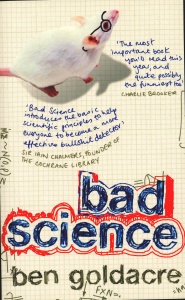Bad Science: How To Mislead, Misinform, and Make Mistakes in Medicine
 |
I just finished reading Dr. Ben Goldacre’s new book, Bad Science. It received a very favorable review by the British Medical Journal, and so I thought I’d take a look for myself. After all, I am passionate about patient empowerment and worry sincerely for their safety as healthcare is becoming more and more of a “do-it-yourself” proposition.
Ben is a talented writer – his style is straightforward, accessible, and witty. The premise of the book is to expose the underbelly of science – how it’s miscommunicated to the public (via media, PR, and representatives from the snake oil community) and how research is often poorly designed (by uneducated scientists and government agencies, for-profit pharmaceutical companies, and biased physicians).
The case studies presented in Bad Science are especially poignant. Ben has selected a few shining examples of self-promoting figures who have risen to the highest rank of “expert” in the eyes of the media – all the while referring to themselves as “doctor” and yet only having a Ph.D. from an online correspondence school. Their legal bully tactics, fabrication of data to support their proprietary health gimmick, and extreme narcicism – are excellent studies in poor character triumphing over common sense. It is painful to see how successful snake oil salesmen can be, even in these modern and “enlightened” times.
Bad Science carefully dismantles the pseudoscience that underlies many of the claims of alternative medicine. He clearly demonstrates how research can be manipulated to demonstrate a positive effect for any therapeutic intervention, and explains why cosmetic and nutrition research are particularly rife with false positive results.
Ben also explores the role of the human psyche in misunderstanding science. Our deep desire to find a 1:1 correlation between every cause and effect is difficult to overcome. We want 1) to bring artificial simplicity out of complexity, 2) a quick fix in a pill form, 3) to believe in “breakthrough therapies,”4) to read sensational or scintillating news headlines. Unfortunately, science is often coopted to pander to these wants, rather than illuminate the truth.
Finally, Bad Science explores the many ways that statistics can be manipulated to support any claim. In fact, human intuition about math in general is quite flawed, which works against us as we try to understand the data collected by researchers.
I finished the book feeling enlightened but somewhat despairing – yearning to read a sequel, “Good Science” if only to restore my hope in the idea that wise people will have the courage to seek truth over sensationalism, and value objectivity over subjectivity for the greater good of all.
What does Ben Goldacre think we can do to combat the tidal wave of bad science on the Internet? He suggests that people of sound mind blog about the subject as frequently as possible, so that those who are searching for a voice of reason may find one. I blog here and at sciencebasedmedicine.org for that very purpose.
In my next post, I’ll summarize some tips from Bad Science that will help you to recognize when a health message is likely to be inaccurate.










